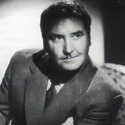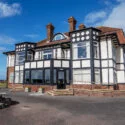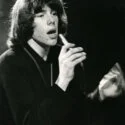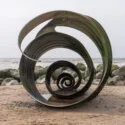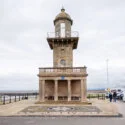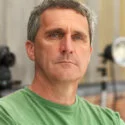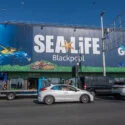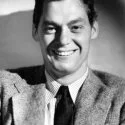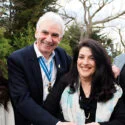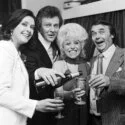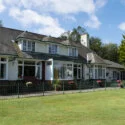Ian Scott Anderson, born on 10 August 1947 in Dunfermline, Scotland, is best known as the singer, flautist, acoustic guitarist, primary songwriter, and sole continuous member of the rock band Jethro Tull. Anderson’s early life was shaped by his father’s work at the RSA Boiler Fluid Company in East Port, Dunfermline. The family moved to Edinburgh when he was young, and later to Blackpool in 1959, where he attended Blackpool Grammar School. Anderson’s rebellious nature came to the forefront during his school years—he was reportedly asked to leave for refusing to submit to corporal punishment, which was still common practice at the time. After leaving school, Anderson pursued fine art at Blackpool College of Art from 1964 to 1966, while living in nearby Lytham St Annes. During his teenage years, he worked as a sales assistant at Lewis’s department store in Blackpool and as a vendor on a newsstand. In 1963, he formed The Blades, a soul and blues band with school friends, including Michael Stephens (guitar), John Evan (keyboards), Jeffrey Hammond (bass), and Barriemore Barlow (drums). Anderson initially played guitar, harmonica, and vocals in the band, but it was with the flute that he would later make his mark.
In late 1967, Anderson was working as a cleaner at the Ritz Cinema in Luton, a job that included cleaning toilets, which he later humorously described as taking up half of his day. At this time, he was still undecided about his musical direction and was not yet proficient on the flute. Anderson had ambitions to become a skilled electric guitarist but felt he could never measure up to the likes of Eric Clapton. Instead, he swapped his electric guitar for a flute, which he began practicing diligently. Within a few months, he was able to play in a rock and blues style, which was the beginning of his distinctive sound with Jethro Tull. Anderson’s first major project, This Was (1968), was recorded just a few months after he began playing the flute. Although he was a relative novice on the instrument, he quickly adapted it into the band’s unique blend of rock, folk, and jazz influences. Along with the flute, Anderson continued to incorporate acoustic guitar into his music, adding soprano saxophone, mandolin, keyboards, and other instruments as his career progressed. Over the years, his virtuosity with the flute, combined with his distinctive voice and songwriting, cemented his place as one of rock’s most innovative and influential musicians.
Jethro Tull went on to become one of the most successful and distinctive bands of the 1970s, with Anderson’s eclectic approach to music continuing to push the boundaries of rock and progressive music. His legacy as a flautist and songwriter is widely celebrated, and he remains a key figure in the evolution of progressive rock.
Ian is famous not only for his distinctive musical style but also for his iconic one-legged flute stance. This unique posture, which became a hallmark of his stage presence, was initially the result of an accident. Anderson had developed the habit of standing on one leg while playing harmonica, using the microphone stand for balance. A journalist mistakenly described him as standing on one leg while playing the flute, and Anderson decided to live up to this reputation, even though he found it difficult at first. This quirky stance has since become synonymous with Anderson and is featured on numerous album covers. It was humorously referenced in the liner notes for Thick as a Brick, where he was dubbed “the one-legged pop flautist.”
Anderson began his solo career in 1980, after Jethro Tull took a break following the death of bassist John Glascock. Anderson initially wrote the album A as a solo project, but pressure from his record company led to its release under the Jethro Tull name, though it prominently featured the participation of Martin Barre and Dave Pegg. His first official solo album was Walk into Light (1983), which leaned into electronic music and featured the influence of Peter-John Vettese. In the 1990s, Anderson began experimenting with simple bamboo flutes, using techniques like over-blowing and hole-shading to create expressive sounds. During this time, his daughter pointed out his incorrect fingering on the flute, prompting him to relearn his vast catalog of music.
Anderson’s second solo album, Divinities: Twelve Dances with God (1995), was an instrumental album focusing on flute-heavy compositions. He later released The Secret Language of Birds (2000) and Rupi’s Dance (2003), continuing his exploration of diverse musical styles. Anderson also recorded “Griminelli’s Lament” in 2003 as a tribute to his friend, the Italian flutist Andrea Griminelli.
In 2011, with Jethro Tull winding down their touring schedule, Anderson began work on a sequel to Thick as a Brick, which was released as Thick as a Brick 2 in 2012 under the name “Jethro Tull’s Ian Anderson.” He performed both albums in their entirety on tour. His 2014 album Homo Erraticus blended progressive rock, folk, and metal elements and became his most successful solo release, peaking at No. 14 on the UK Albums Chart.
Anderson’s contributions to music have been widely recognised. In 2006, he received the Ivor Novello Award for International Achievement and an honorary Doctorate of Literature. He was appointed Member of the Order of the British Empire (MBE) in 2008 for services to music and was awarded an honorary Doctorate from Abertay University in 2011. Anderson was also named “Prog God” at the 2013 Progressive Music Awards.
Outside of music, Anderson has a diverse range of interests. He has been involved in the production of Steeleye Span’s albums and has worked with other artists, such as Maddy Prior. He owns several properties, including a 16th-century farmhouse in Radnage, England, and a house in Switzerland, as well as an estate on the Isle of Skye, Scotland. He has two children: James Duncan Anderson, a musician, and Gael, who works in the film industry and is married to actor Andrew Lincoln.
Anderson is also a survivor of deep vein thrombosis and has used his platform to raise awareness of the condition. He has spoken out against both extreme political ideologies, opposing “prejudice, xenophobia, and hard right conservatism,” while also criticising what he calls “wokeness” for stifling open debate. He has also been vocal about his battle with chronic obstructive pulmonary disease (COPD), a condition he attributes in part to his use of smoke machines during live performances.
In addition to his music career, Anderson has invested in salmon farming and is a director of several companies, including Jethro Tull Production Limited and Ian Anderson Limited. His life and work continue to inspire musicians and fans alike, and his legacy as a pioneering figure in progressive rock endures.
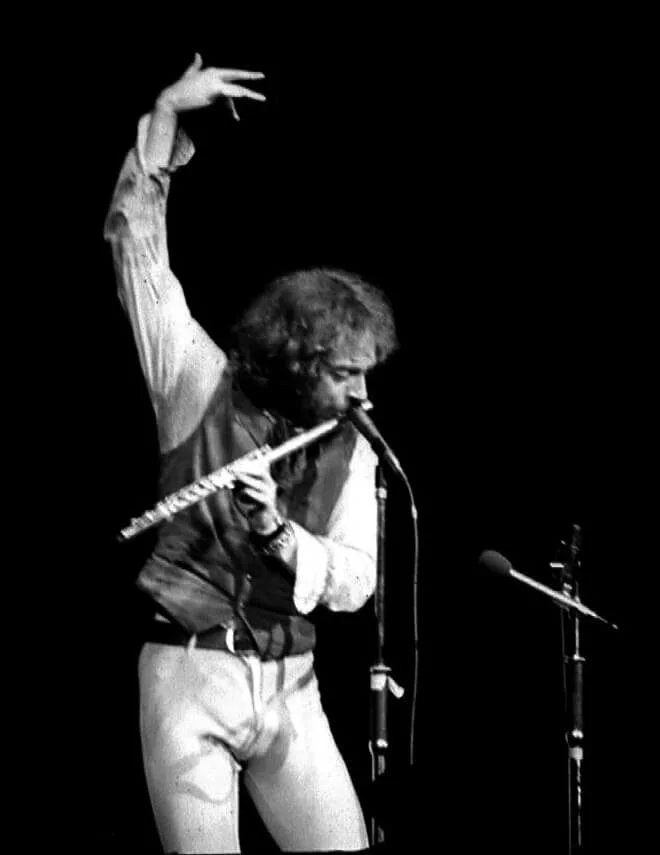
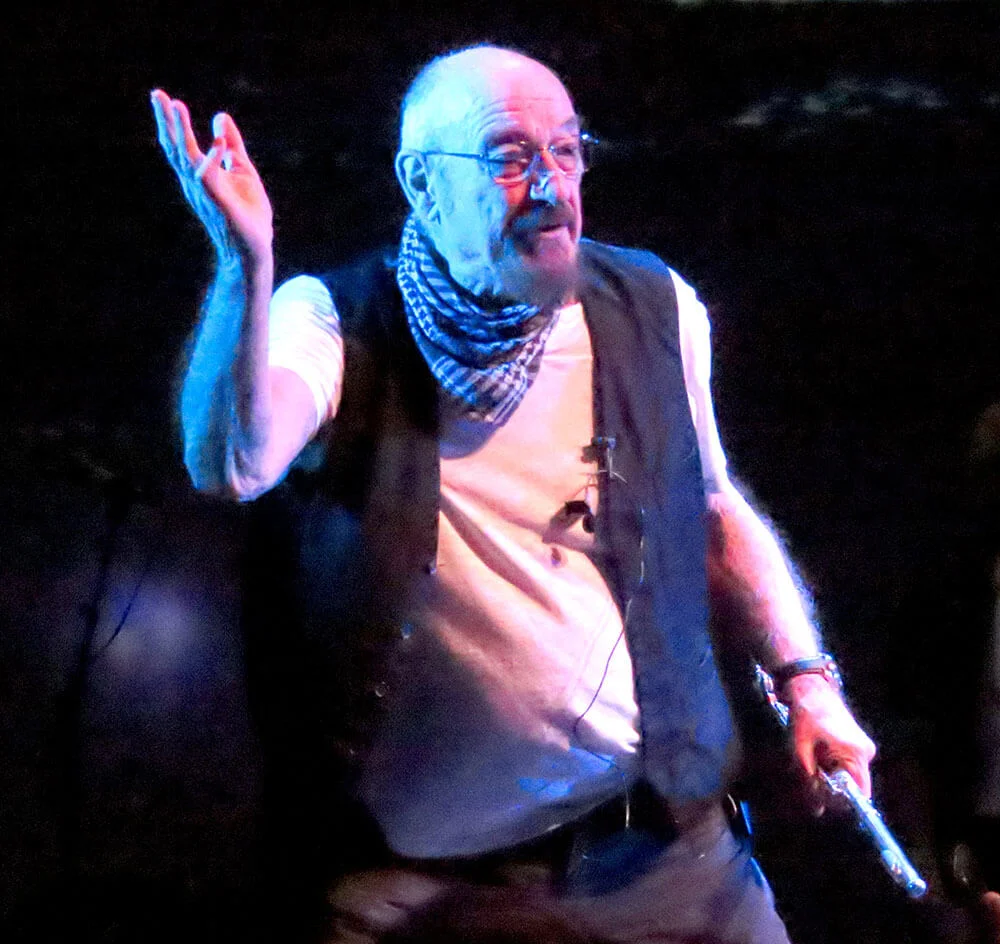
Featured Image © Steve KnightCC BY 2.0
Additional Images © Jean-LucCC BY-SA 2.0
Background Image © Sdo216CC BY-SA 3.0

